Here’s the startup idea that won these Sixth Form students RM50K from 1337 Ventures

[This is a sponsored article with HELP International School.]
Picture this: You’re a secondary school student tasked with a volunteer project. You and your group must work with a reputable NGO or social enterprise as part of your course’s syllabus.
You pick an organisation and message their socials, drop them a professionally written email, and call the phone numbers provided on their site.
But you’re left ghosted. So, you reach out to dozens more, only to receive one reply in the end, just barely in time before the project deadline.
There needs to be an easier way to go about this, and that’s exactly what BRIDGE CONNECT aims to solve.
The platform bridges the gap between the youth and NGOs in finding and securing meaningful volunteer opportunities.
Founded by a group of Sixth Form A-Level students from HELP International School in 2023, the team went on to bag RM50,000 from a venture capital firm and startup accelerator, 1337 Ventures, to pursue their project as an actual business.
Meet the team: The BRIDGE CONNECT team was founded by eight Year 12 students who were between 16 and 18 years old at the time. They are Lee Ka Dong, Mia Lee Ying Ying, Skye Teh Xin Yee, Samitinjay De, Julianne Yap, Chong Mae Jian, Germaine Soo Jen Ning, and Katrina Ong Kai Qing.
Bridging the gap
Speaking to Vulcan Post, the students shared that the above problem was something they’ve faced themselves, which inspired their conception of BRIDGE CONNECT.
While building their platform, the HELP International School students connected with the Malaysian Foundation for the Blind (MFB) and Universiti Kebangsaan Malaysia (UKM).
The organisations needed help creating Malay-to-English braille dictionaries that could benefit around 70,000 blind and visually impaired people in the nation.

“They granted us a massive opportunity to assist with the data entry stage for the first braille dictionary in Malaysia,” shared Mae Jian.
Needing more hands on deck for the tedious task, the team utilised their BRIDGE CONNECT platform to gather student volunteers.
Through this experience, the BRIDGE CONNECT team presented their solution at their school’s Project Purpose Demo Day, which invited various partners from industry, including 1337 Ventures, represented by its founder, Bikesh Lakhmichand.
It’s the final test of Project Purpose, a programme developed by HELP International School to educate its young talents to think innovatively and foster an entrepreneurial mindset.
In an interview with BFM, Bikesh stated that he was compelled to fund BRIDGE CONNECT after witnessing the team’s tenacity and business acumen in building their platform.
“They proved to me that it wasn’t just an idea for their school project. They showed me that this was an actual problem, conducted surveys to show that people wanted their solution, and then built a website on their own without spending a single dime,” recalled Bikesh.
He added that this process was akin to how startups are created in the real world, and believed that the project could make an impact in society should it pan out as intended.
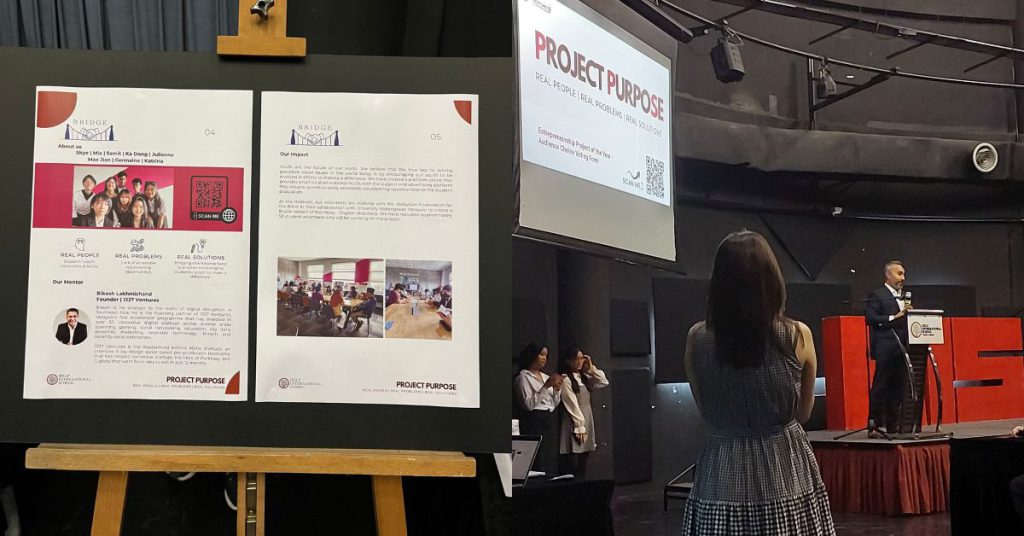
“After receiving the funding, we’re working with Mr Bikesh to register us as an SDN BHD company,” said Germaine Soo. “Now, we are in the process of making the official website for BRIDGE CONNECT.”
The team shared that they’ve since utilised the funds to set up BRIDGE CONNECT as an official business. This includes the backend processes like hiring a company secretary, registering the business, and setting up a business bank account.
They’ve also utilised the funds for on-ground marketing initiatives to drive awareness about their solution.
Furthermore, BRIDGE CONNECT is connecting student volunteers with other forms of online volunteering such as managing social media channels for NGOs, writing articles, research, and more. “This is to achieve our goal of making volunteering more accessible to students,” Katrina Ong said.
While the eight students behind it will be moving on to universities around the world, they remain committed to building their platform, and can still do so as it’s operated entirely online.
“We also hope to pass this project on to our juniors in HELP International School by hiring them as interns to help manage physical events like workshops and booths,” added Katrina. “By doing so, we can foster this student volunteering community in Malaysia.”
Meanwhile, the braille dictionary is currently in development and has completed its prototype stage as of Q1 2023, according to The Star.
Building social entrepreneurs
The success of the BRIDGE CONNECT team might have been harder to achieve if not for Project Purpose.
Part of the school’s Sixth Form (A-Levels) programme since 2021, it’s a course at HELP International School where students learn through the hands-on experience of starting a social enterprise. It aims to discover students’ untapped potential that goes beyond traditional coursework.
For context, traditional A-Levels involve students studying up to four subjects. At HELP International School, students get the option to go the traditional route, or pursue three subjects alongside Project Purpose.

At Project Purpose, students are guided through startup fundamentals like ideation, research, budgeting, product development, business planning, marketing, and impact assessment.
The programme works with experts in the Malaysian startup scene, namely 1337 Ventures’ Bikesh, NEXEA’s Justin Lim and Ben Lim, and ScaleUp’s Aaron Sarma.
Students also have the opportunity to collaborate with local entrepreneurs, giving them access to first-hand insights and building their network.

The Project Purpose journey concludes with Demo Day, during which students will pitch their solutions and demonstrate how they can transition into real-world ventures.
Continuing the success
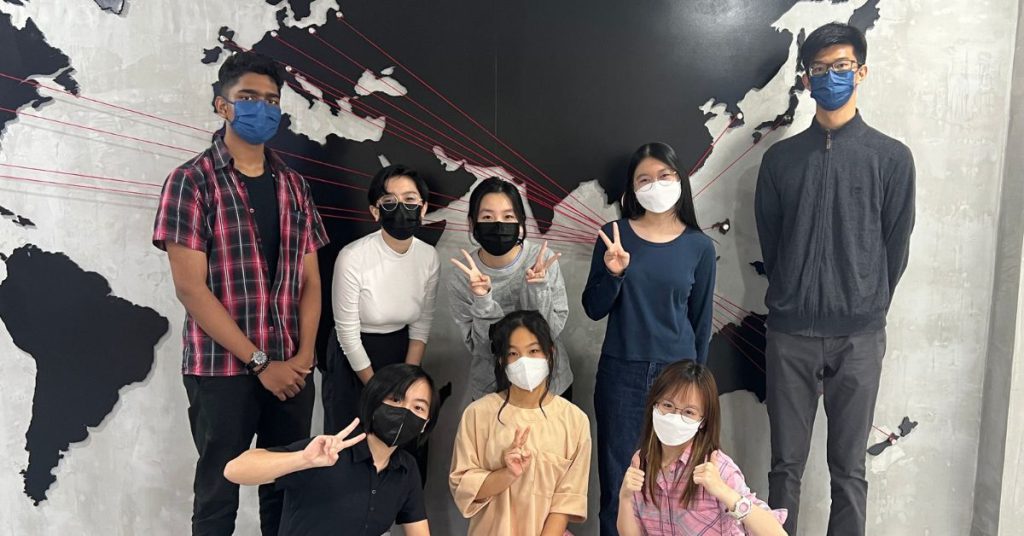
BRIDGE CONNECT has impacted more than its beneficiaries, as they’re also challenging societal beliefs that kids who grew up in our digital world are overly pampered.
“Being from the current generation of instant gratification, as these students witness their projects making an impact and as their seniors gain recognition for their work, students become intrinsically motivated to make their projects a success,” shared Manmeet Kaur, Project Purpose Coordinator.
She elaborated, “Once they’re placed in a safe environment, [and are] explicitly told that it’s okay to fail, all students are willing to try something new and step outside their comfort zone.”
Now in its fourth cohort, HELP International School’s Sixth Form will be accepting enrolments for their August 2024 cohort from now till July.
Students who have completed their GCSE, SPM, or equivalent are welcome to join the programme and embark on the Project Purpose journey, which you can sign up for here.
- Learn more about BRIDGE CONNECT here, and HELP International School’s Sixth Form here.
- Read other education-related articles here.
Also Read: Why M’sians need to join this 2-day event in PJ that’ll boost your understanding of IPs
Featured Image Credit: HELP International School
Wanting more M’sians to learn code, he created a free app that’s like Duolingo for coding
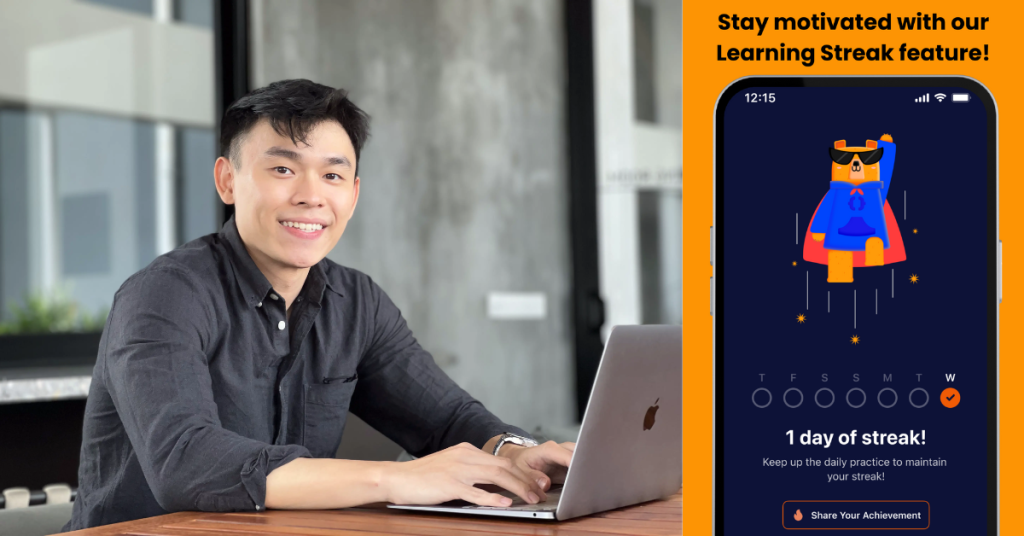
Learning how to code has always been something that many of my peers and I wanted to pick up. Yet, as working adults whose exposure to coding is basic lines of HTML at most, it’s something that’s perpetually on our backburners.
If you can relate, I’m happy to report that there’s a Malaysian app that might just solve our collective problem.
Called Codeo (or Codeo.ai), it’s described as a Duolingo for coding. Like how the popular language learning app offers bite-sized lessons, Codeo simplifies coding education for complete beginners with gamified features and short lessons.
Funded by a RM100K grant from Cradle Fund’s CIP Spark programme, here’s the story of how Codeo came to be, and what it aims to do.
Not his first rodeo
Starting his career in the VC world, Deric Yee quickly learnt it wasn’t something he enjoyed doing.
“I was more involved as the ‘finance guy’, but I wanted to be getting my hands dirty, building and steering the ship for my business, rather than being the financier,” he explained.
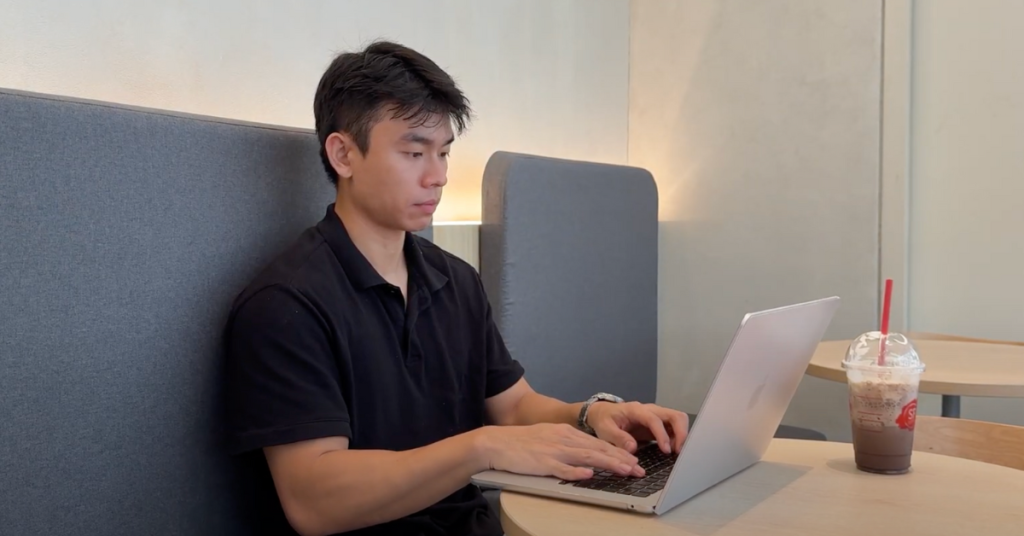
That’s why he quit his job to pursue a path in tech. For about a year, it was an incomeless hobby before Deric began taking up projects.
Within a month, he closed his first project at around RM10,000. The next one was around RM100,000+. Over time, he even got friends who paid him to mentor them in their Computer Science degree studies.
Recognising a strong demand for tech education and talent, he co-founded The Hacker Collective with his previous business partner Ming. They would charge a small fee to teach people coding skills for any career. However, they faced cash flow issues and struggled to get the project off the ground.
So, Deric pivoted to start Sigma School to serve people who wanted jobs in tech. The online school offers a three-month coding bootcamp to help students get jobs in tech, or their money back if they don’t get a job after graduating the bootcamp.
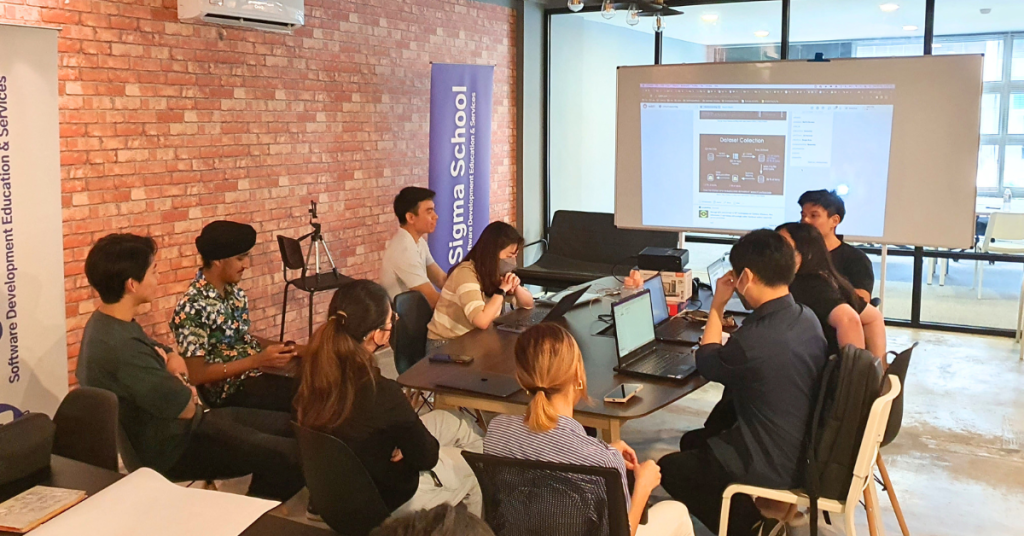
Knowing firsthand the gaps between what the industry needed and what traditional education was providing, Deric designed Sigma School to provide students with skills they actually need to succeed in the industry.
A beginner’s introduction into coding
As mentioned, Codeo kicked off with a grant from Cradle Fund’s CIP Spark. The pain point he wanted to address was something he found “painfully obvious”.
“Everybody wants to learn to code, but not everybody has the privilege of sitting in front of their laptops 10 hours a day like I did,” he pointed out.
As someone who would learn with Duolingo during his commute, he saw an opportunity to do the same for coding.
“We need a user-friendly, fun, gamified way of learning to code for casual learners and I believe Codeo will be the one to make this happen,” he said, claiming that there weren’t good coding apps in the region.
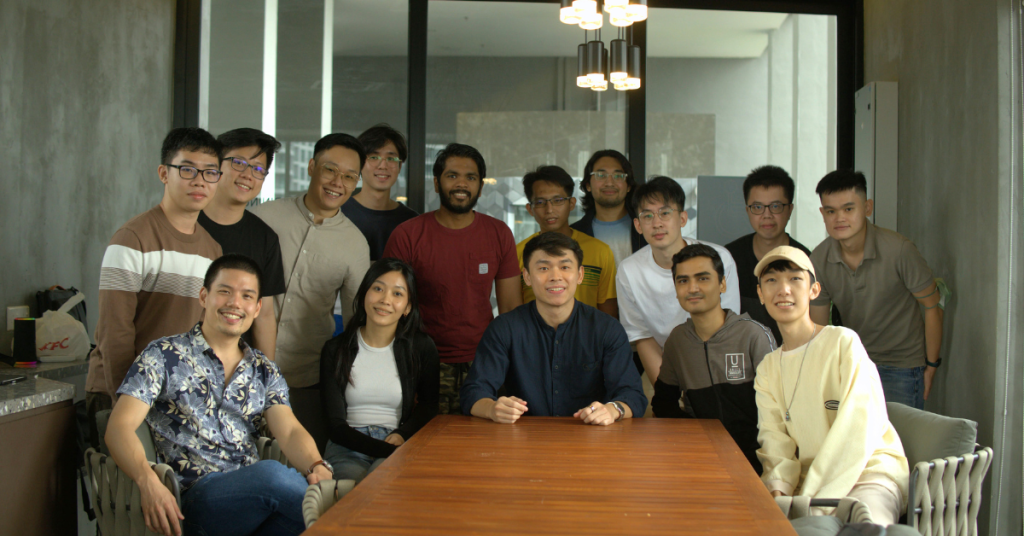
Designed to be a free platform offering short and simple lessons, Codeo serves a completely different audience compared to Sigma School.
So, instead of competing with each other, the founder sees them as complementary solutions that make up a dream team.
“Whether you want the serious, straight path to a coding job, or just want to dip your toes in the coding world while playing games, you’ve got help. They’ve got you covered from all angles,” he shared.
An AI-integrated app
The development of Codeo took around six months, including user research, UI/UX process, frontend and backend development, as well as AI integration.
Specifically, there are three AI-enabled features that are key to Codeo.
The first is AI Persona, which creates a personalised learning experience by using analogies from popular idols like Cristiano Ronaldo, Lee Chong Wei, or LeBron James.
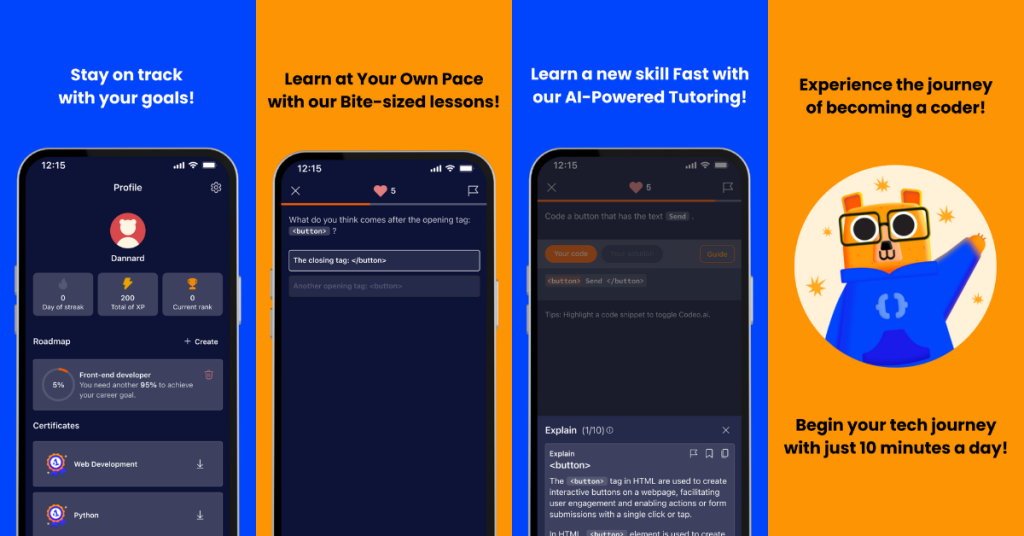
“It’s designed to make learning coding more relatable and inspiring, as if you’re being coached by your favourite sports star or celebrity,” Deric said.
There’s AI Elaborate which simplifies topics, breaking them down as if explaining them to a 5-year-old. This ensures that even beginners without a technical background can grasp the basics of coding without feeling overwhelmed.
Lastly, to cater to a global audience, the AI Translate feature helps bridge language barriers by translating technical terms and explanations into different languages.
On top of that, Deric is working on integrating Codeo with an automated job matching startup, helping users who completed milestones to apply for remote jobs.
A profit-driven company
Officially launching in April, the app has already achieved around 300+ signups without running any paid ads. Three users have even paid US$297 each for the lifetime deal.
Although free, Codeo will be monetised through subscription-based access to premium features, one-off purchases for specific courses or features, corporate or educational licences, as well as advertising and partnerships.
Deric has also devised a certification fee, charging for credentials upon completing certain courses or learning paths.
Thus far, Codeo has been intentionally bootstrapped so Deric can have more control to steer the ship and not be pressured to “grow at all costs”.

“I believe business should be profit-first,” he explained.
The entrepreneur references Y-combinator founder Paul Graham’s insights on how he splits businesses into two categories—default dead or default alive.
“If a business is not profit-making, and has no path to profitability, it is default dead,” Deric elaborated. “I wouldn’t want to be in a default dead business, nor would I want to raise funds for a business that is default dead.”
Hence, instead of fundraising, the founder wants to first make sure his model works, creating a product so good that it can retain a healthy monthly recurring revenue. Only then will he consider raising funds with likeminded investors so Codeo can scale faster.
A futureproof country
Right now, Deric’s goal is to onboard 10,000 users and 1,000 active users within the next quarter.
He hopes to reach out to underserved communities, B40 groups, refugee groups, as well as blue-collar workers to try out the app for free.
“We will be building with them in mind for sure, to help them have the education needed to break out of the poverty cycle,” he explained.
By the end of the year, he targets to monetise at least 10% of their active users and start reaching out to corporates for collaborations.

But his Big, Hairy, Audacious Goal would be to have a coder in every household, despite arguments that coding will become less valuable as it becomes replaced by AI.
“Since day one, the reason I joined the tech industry is because I see every single industry eventually being disrupted in some way, shape or form due to the adoption of technology,” he explained.
“It’s something we cannot run away from. So, I want to help myself and the people around me be equipped with the skills to navigate this space as well as possible.”
Also Read: Employees need a Copilot to boost productivity & ease brain drain. This webinar shows how.
Featured Image Credit: Codeo
What happens when a “crazy cat lady” starts a hijab brand? This M’sian biz is the answer.
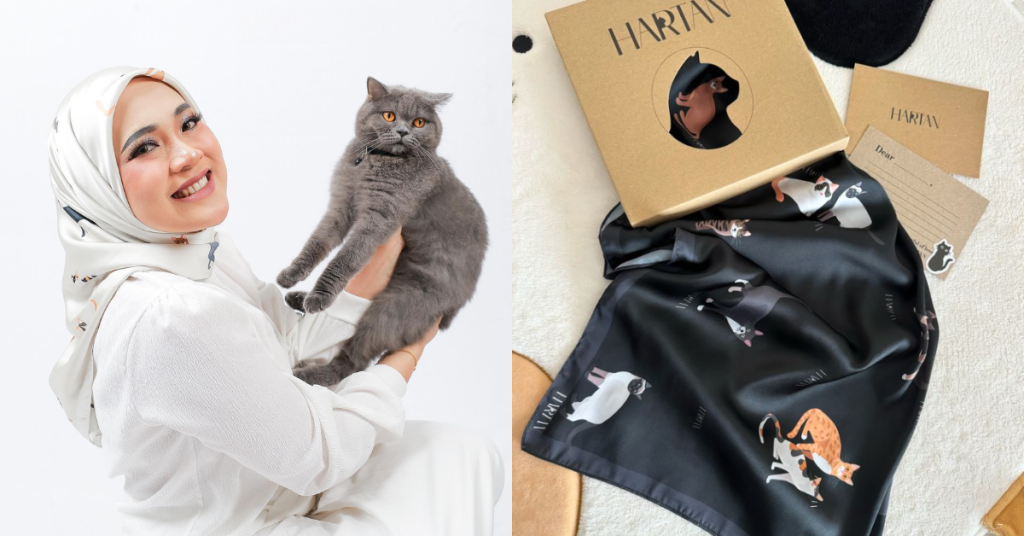
Have you ever walked into a store and found something you really liked, only to walk away disappointed after checking the price tag?
That’s how Umai felt a few months ago. She had just tried on a cute cat scarf before having to leave the KL luxury store with a heavy heart. Even then, though, it never left her mind, and she was quite hung up on it for several days.
Until September 7, 2023, when her husband threw her a curveball—”Why don’t you design your own cat scarf at an affordable price? What’s stopping you?” Amir Subril prompted.
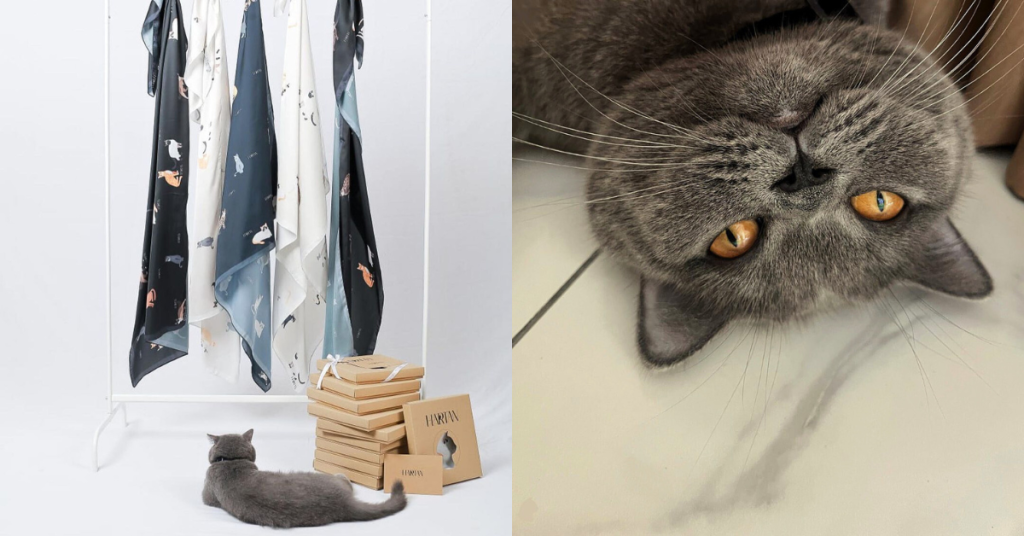
That’s what triggered Umai to start The Hartan, her own scarf brand with a feline theme.
It’s quite a leap for the 29-year-old as she wasn’t keen on leaving her comfort zone. Launching a business means taking risks. And at the time, the couple had already left their corporate careers to run the family business of homestays and chalets in Bagan Datuk, Perak.
But Amir viewed it as an opportunity to try something new. “Whether you succeed or fail, at least you tried. It’s part of life’s journey,” he reminded her.

Thus, giving her the push she needed to undertake this venture with him.
A “club” for crazy cat ladies
As a self proclaimed crazy cat lady, Umai obviously has a furry companion of her own. Called Muk, the British Shorthair is one half of the inspiration behind The Hartan.
The other half is the couple’s young daughter, Natrah, who has an adorable relationship with Muk. Reflecting on this, Umai envisioned a charming fusion of Natrah wearing a scarf and black sunglasses, playing with Muk.
Thus, birthing the concept for The Hartan.
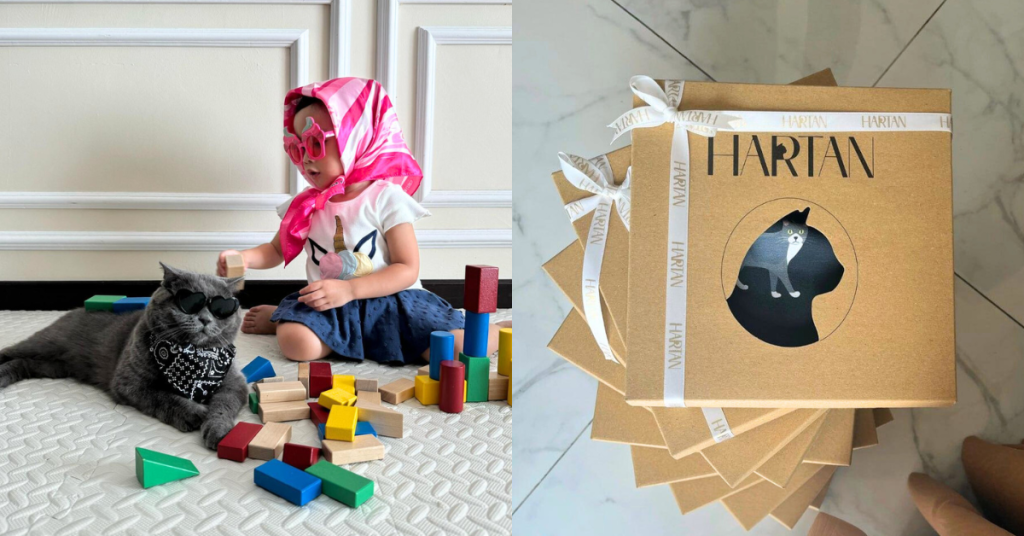
A quick browse through The Hartan’s website and you’ll find that they’ve only launched three designs so far: The Clowder of Catso, Muk Thru The Glass, and its latest one for Raya called Kitty Di Aidilfitri.
This is an intentional move by the brand to slowly introduce its products in the saturated Muslimah hijab market.
Sharing with us, Umai explained that they’re planning to launch a new product every month to keep the ball rolling. To date, they already have a few lined up for half of the year.
Each design takes up to five days to complete and is the work of Umai’s best friend, who she affectionately calls “a crazy cat lady” like her. As such, the couple doesn’t have to elaborate on many details for her to help bring their design visions to life.
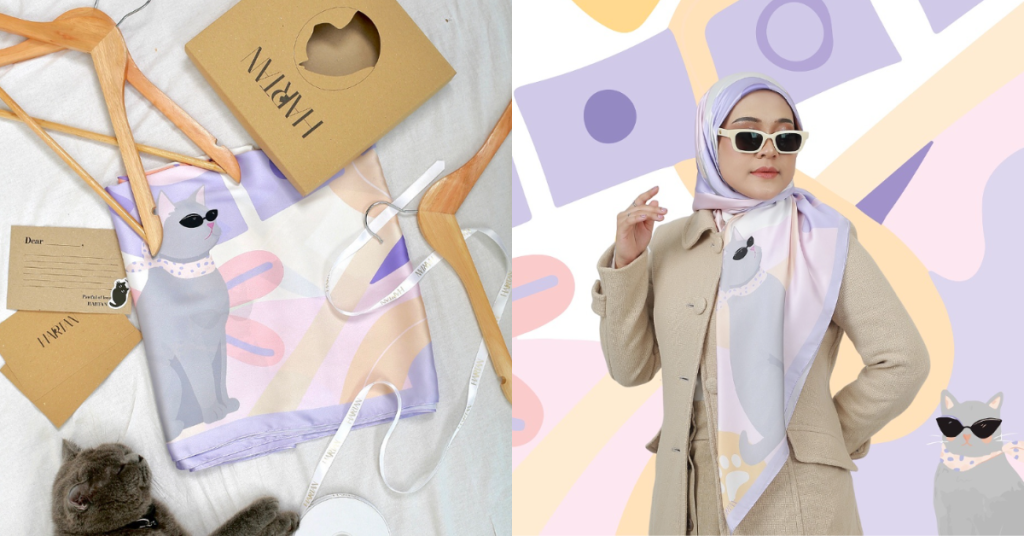
Looking good, “feline” good
All of The Hartan’s patterns (RM89) come in various colours and two shapes to choose from, a rectangular shawl and a square scarf. The release of different sizes allows the brand to capture a larger Muslimah market.
For context, hijabis have different preferences when it comes to styling their hijabs. The traditional style uses a square scarf (also called “tudung bawal” in Malay), while the rectangular shawl looks more modern.
But The Hartan isn’t just for people wearing headscarves, it’s for anyone who loves cats.
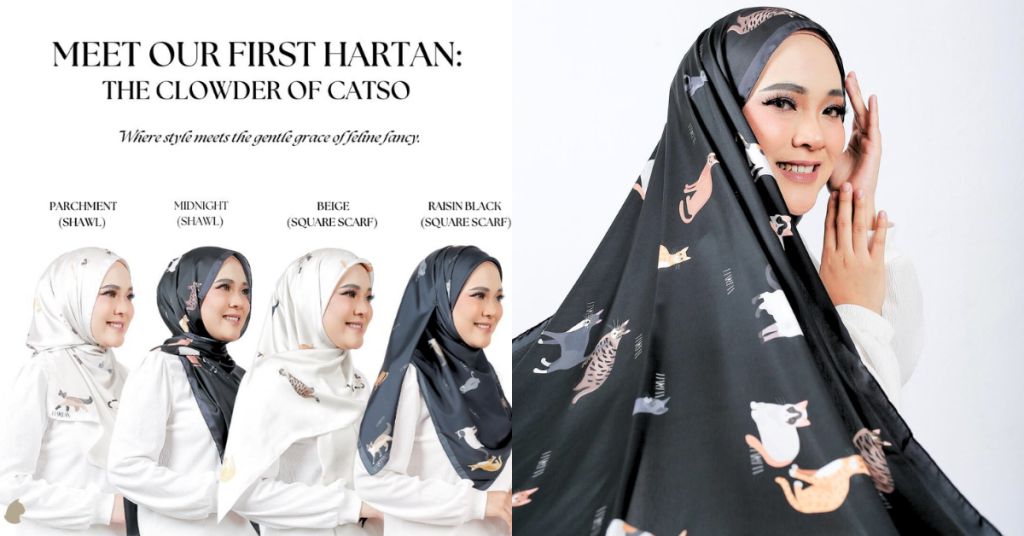
Non-hijabis can use the scarfs as a twilly to drape around your neck or to add some flair to your handbags. Another alternative is to wear them as makeshift tube tops, the kind you see Gen Z fashionistas do these days.
And you’d be right to think that they’re hoping to garner a loyal customer base of young adults.
However, quirkiness has no age limit. A good portion of their sales comes from women in their 40s who don’t necessarily think of themselves as cat lovers.
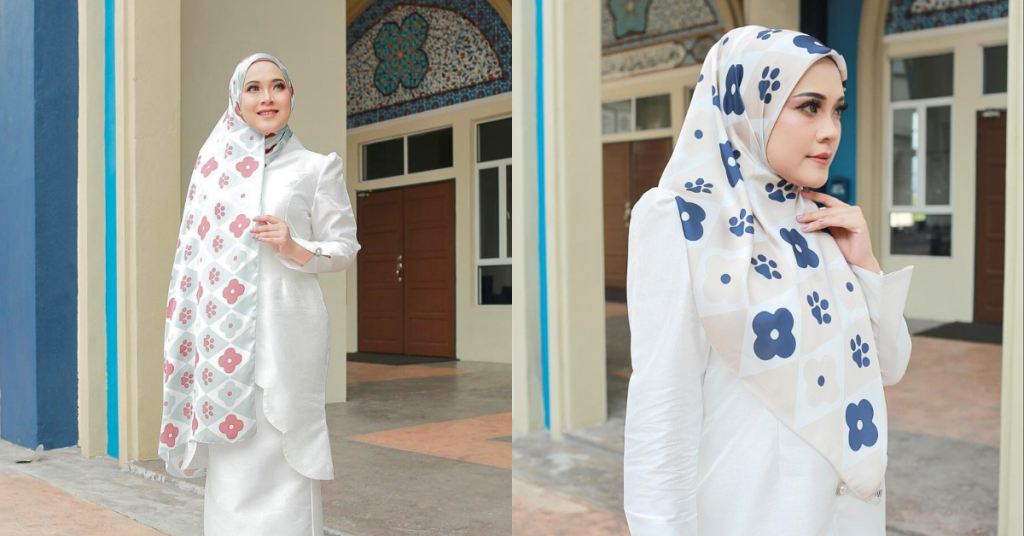
As a small business, the brand focuses on producing low volumes of scarfs. This allows them to analyse and determine which designs people like without a large capital expenditure.
Having the right cat-titude
The Hartan is one of the few (if not only) hijab brands in Malaysia pioneering cat-themed scarves. This is in and of itself an achievement since they’re carving out a new niche that aligns with their own passions.
That said, you can’t be too careful as designs can be easily stolen. We’ve seen it happen quite a few times where big labels copy the works of smaller-scaled entrepreneurs. Not dropping any names, but the stories are just a Google away.
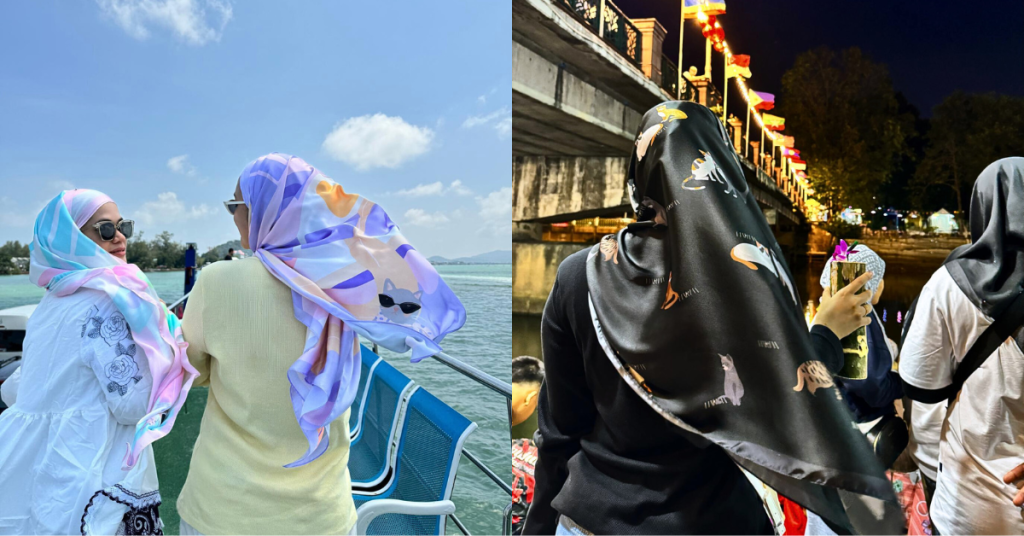
So getting intellectual property (IP) rights for The Hartan’s designs is undoubtedly in Umai and Amir’s agendas.
Should they face such an issue in the future, though, the couple are prepared to deal with it sensibly. “We would see it as a marketing opportunity for us to grow and grab as much attention as possible so that people would know [the brand],” Umai shared.
“The Hartan is not just about designs. We’re more than that. The Hartan is a journey, our journey. No matter what happens, we’ll continue to survive by doing our very best.”
Currently, the brand’s products are only available on their website, and they have no plans of setting up a physical store yet. Instead, the focus will be on online marketing.
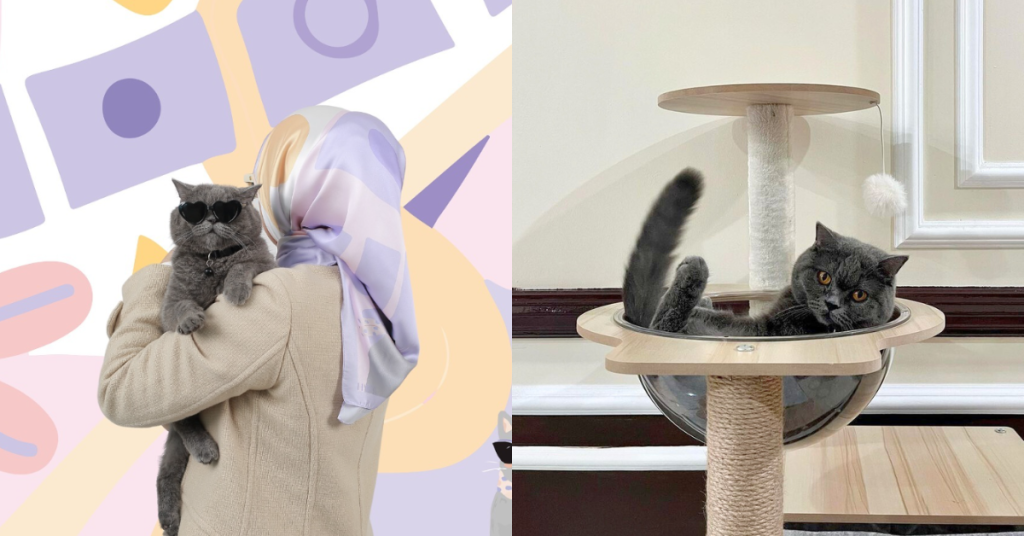
They’re also planning to sponsor a few local animal shelters to share their earnings with the furry friends in need. After all, The Hartan is all about cats and the couple’s hope is that stray felines will get the love and care they deserve.
Also Read: Employees need a Copilot to boost productivity & ease brain drain. This webinar shows how.
Featured Image Credit: The Hartan
Why Table & Apron’s founder opened a bakery next door when it “made little business sense”
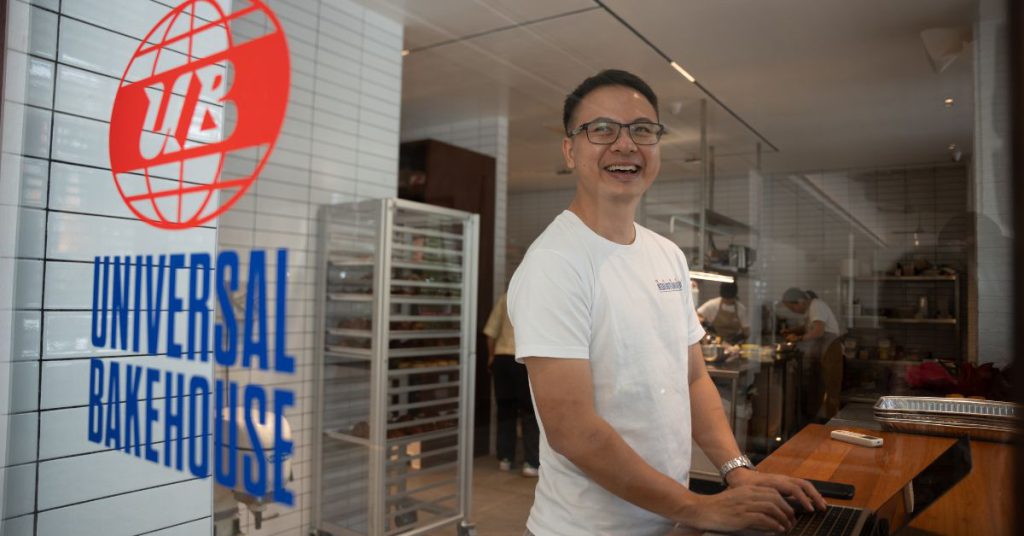
Established in 2014, Table & Apron has undoubtedly become a staple in Damansara Kim. We’ve even featured the business back in 2017, speaking to its founder Marcus Low about how he revamped the business after losing his core team.
Now, nearly seven years after our last interview, Marcus has not only sustained Table & Apron, but has also opened a bakery right next door.
“The birth of Universal Bakehouse was an organic page-turner for us, rather than a business decision,” he shared with us. “The opening of Universal Bakehouse made little business sense at that time.”
When the space became available, the team’s first thought was to expand their restaurant space. It had been five years since they opened Table & Apron, business was good, and they could do with more seating.
But, as we know, that wasn’t what happened.
Marcus explained, “We were compelled by a number of reasons: My team was hungry to venture into something else, and we wanted to see if we could apply our philosophy of running Table & Apron successfully in a bakery instead.”
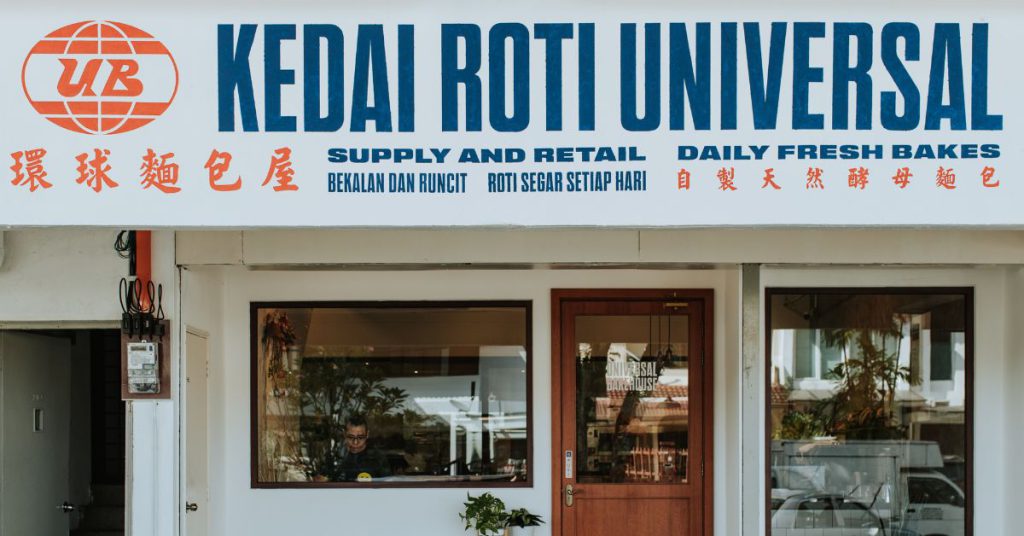
This made sense in terms of productivity too. Since the inception of Table & Apron, the kitchen had been baking their own breads.
But at that point, the chefs had been complaining about how inefficient it was to make sourdough breads in the restaurant due to space constraints. On top of that, the breads didn’t contribute much in terms of sales.
The most compelling reason, though, was the honour of taking over a business that was very much part of the Damansara Kim community for 40 years.
Honouring a neighbourhood legacy
Those from the neighbourhood will understand that Universal Bakehouse is an ode to its predecessor in both its name as well as its concept.
Before it was a bakery, the space had been home to Universal Laundry, a laundry shop that had serviced its community for four decades.
Marcus shared that the owner was one Mrs Low (no relations to the younger Low), who grew to be an advisor to him.
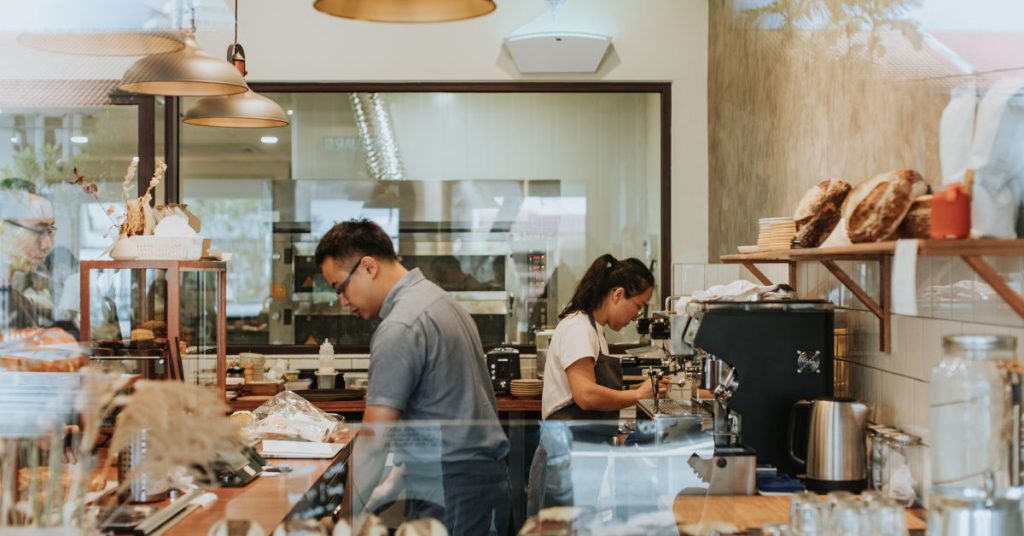
“We spoke the same language of life, except she spoke in Cantonese, and I spoke in English,” the founder shared fondly. “At 80 years, she decided it was time to retire. When the owner retired her dobi, she left us with a week’s notice, and her blessing.”
Given her legacy and their relationship, Marcus shared that it felt like an honour and privilege for him to start a new business there.
Paying homage to the spot’s history, they kept the store signage to the original design, setting a purposeful compass for the team.
With that, funded by the profits of Table & Apron, Universal Bakehouse opened in October 2019.
An organic growth
As alluded by its nostalgic design cues, Universal Bakehouse is designed to be a neighbourhood bakery, evoking a sense of timelessness rather than trendiness.
It was during the pandemic that the bakery really took off. With dine-ins for Table & Apron restricted, it became clear that opening a bakery ended up being a gerat business decision.
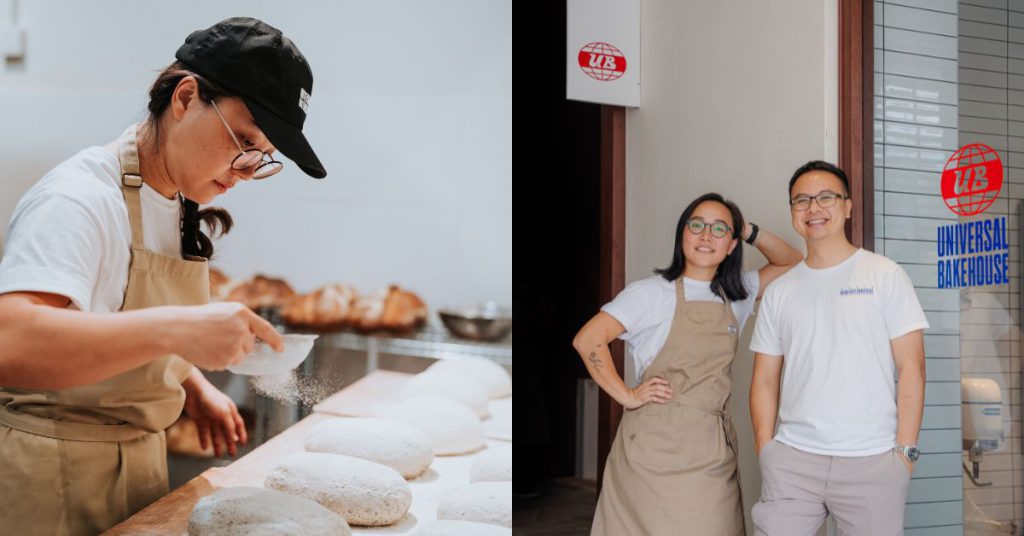
But in any case, Universal Bakehouse had been popular from the get go, even though many had no idea they were related to Table & Apron.
“By design, we’re a multi-concept operator that seeks to define a space to stand on its own feet, independent of our other brands,” Marcus elaborated.
After all, running a restaurant versus a bakery is actually quite different, which was something Marcus had to learn.
“Coming to terms with the logistical and production challenges of a bakery business meant us re-learning how to operate a business from a much more procedural point of view, as well as adopting new terminology that was never part of our vocabulary,” he pointed out.
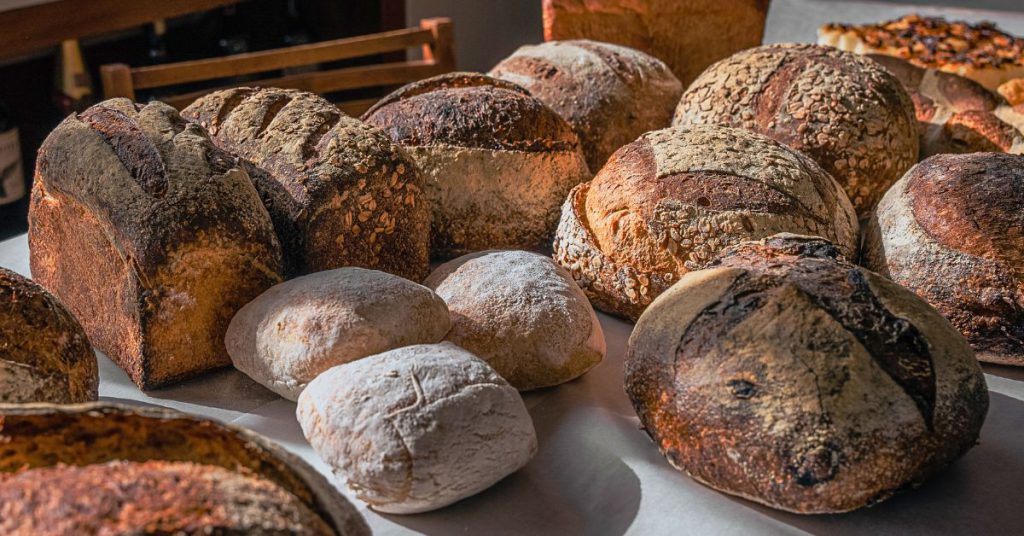
That said, his experience with the restaurant has taught him a lot about the service industry in general. One key lesson is that oftentimes, things have less to do with the food, but rather the entire experience.
“I’ve learnt that applying generosity when guests least expect it is one of the most underrated and affordable methods of being effective in this industry,” he said. “A disappointed customer is always an opportunity to create a loyal customer.”
Staying true to their craft
Over the past few years, the bakery and restaurant scene has been evolving at a rapid pace, with many new stores opening up at every corner.
And with that comes the temptation to be “on trend”. The key, though, is staying true to what one does best.
For Universal Bakehouse, this means sticking to the classic and beloved products like sugared doughnuts and butter cakes that stand the test of time.
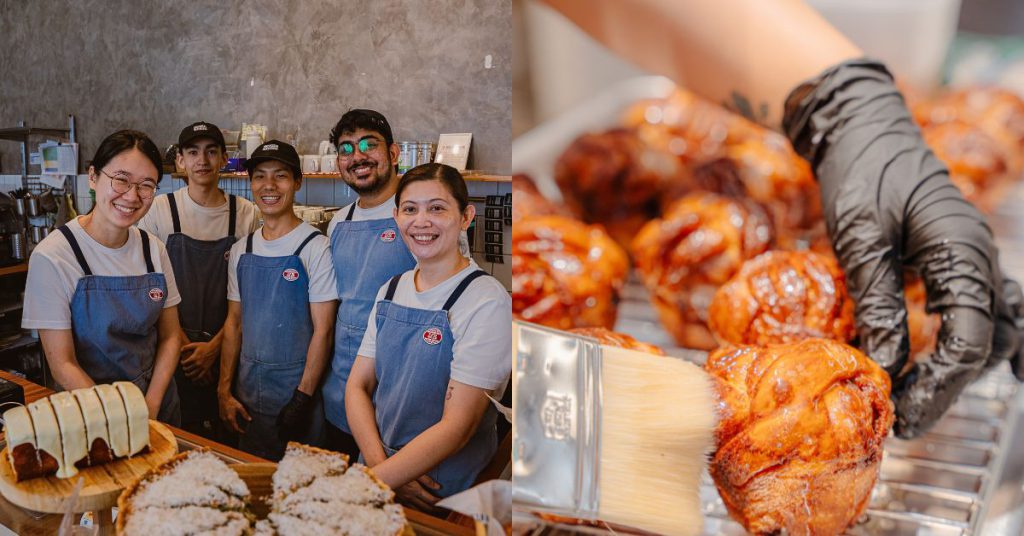
“Our biggest challenge has always been to maintain a strong sense of place and identity as a bakery, to our team, and to our guests,” Marcus told us.
But all that said, the founder believes that these bakeries mushrooming everywhere is a good thing, as it means more opportunities for aspiring bakers, stronger competence training in baking techniques, and better career paths for the average baker in Malaysia.
“The tide rises for all boats,” Marcus determined. “I’m a strong advocate for contributing to a healthier and sustainable industry in foodservice.”
From neighbourhood restaurant to F&B empire
Aside from Universal Bakehouse and Table & Apron, Marcus and his team are also behind another brand, Basic Wine Store.
Marcus revealed that they’re working to consolidate these brands under one management structure. In line with that, they’ve been restructuring the company and moving away from the “independent single-boss” method of operations.
“Think of it like parenting three children of different personalities, and nurturing them with the same value,” the founder explained.
A people-centric company, the goal is to become a group with strong career development structure for those who choose to commit their career to the hospitality industry. That’s why Marcus believes it’s vital to create an environment of autonomy with accountability.
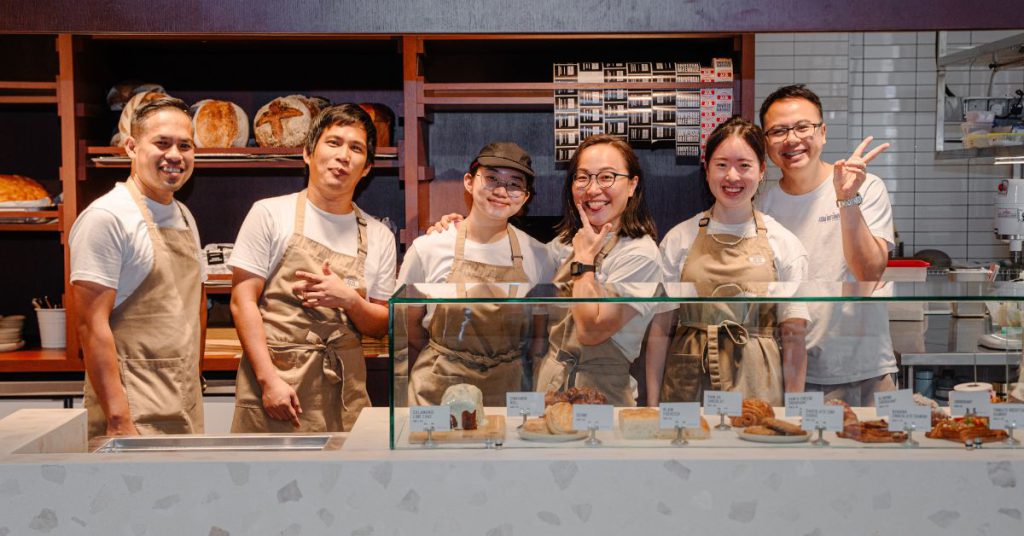
“Having the opportunity to work with young chefs who turn into leaders is a great privilege,” Marcus shared. His group has had four alumni that went on to open their own establishments, and several who are doing well in their careers overseas.
After about a decade in entrepreneurship, Marcus shared that the experience has honed his craft and articulation of philosophy. But that doesn’t mean he falls back on what he knows and remains stagnant in his vision.
“What works today won’t work for tomorrow,” the F&B entrepreneur advised. “Change is constant, embrace it.”
Also Read: Employees need a Copilot to boost productivity & ease brain drain. This webinar shows how.
Featured Image Credit: Universal Bakehouse
Why M’sians need to join this 2-day event in PJ that’ll boost your understanding of IPs
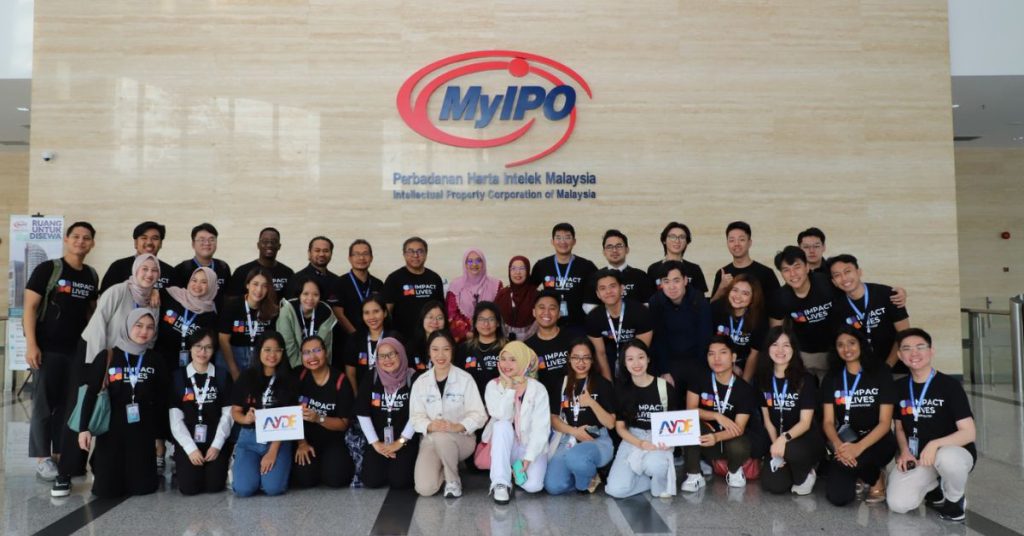
[This is a sponsored article with the Intellectual Property Corporation of Malaysia.]
Every now and then, accusations or infringement cases crop up around brands “stealing” or “copying” another’s creative work, design, or even name.
One noteworthy case of this happened in 2001, when ChipsMore, the British chocolate chip cookies brand, successfully sued the Malaysian ‘ChipsPlus’ for trademark infringement. The case detailed that ChipsPlus was selling equivalent products under a similar name.
A trademark is a type of intellectual property (IP) consisting of a recognisable sign, design, or expression that identifies and distinguishes a product or service. McDonald’s golden arches or Nike’s swoosh are some examples of trademarks.
As ChipsMore already had its trademark registered in Malaysia since 1990 and an established brand presence, the High Court decided in favour of ChipsMore.

Of course, the above is an example of an infringement suit involving a large corporation in Malaysia equipped with the funds and legal team to safeguard its IP.
But when it comes to smaller creators, accusations rarely get escalated to court, such as these fashion design cases we’ve covered involving disputes made by smaller designers against Vivy Yusof and Christy Ng.
The World International Property Organization suggested that smaller creators in the fashion industry make little use of national and regional laws to register and protect designs.
This may be because the shorter life cycle of such products may not justify the financial cost involved in legally registering and protecting them.
Although that’s regarding the fashion industry specifically, the same scenario likely applies to small businesses and creators in other sectors too, who don’t think about registering an IP to protect their work and ideas until it’s too late.
The Intellectual Property Corporation of Malaysia (MyIPO) wants to change that.
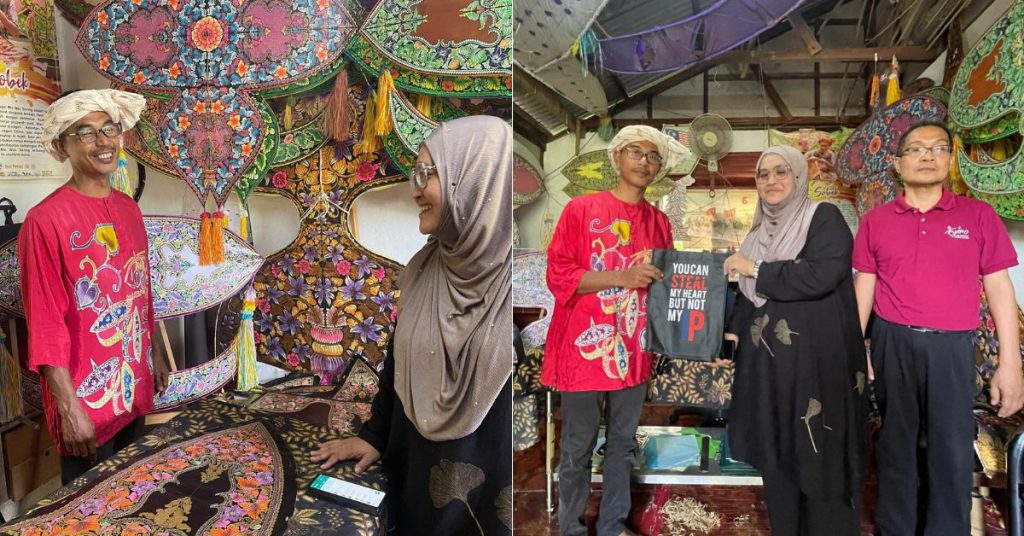
In conjunction with World Intellectual Property Day on April 26, Malaysia’s official IP organisation is hosting a three-day event to educate the public on the importance of IP.
Called Hari Harta Intelek Negara 2024 (National Intellectual Property Day 2024), the free event is taking place in MyIPO Tower at PJ Sentral, from April 24 to 26, 2024.
Here’s why IPs matter on an economic scale
Malaysia is home to an increasing number of knowledge-intensive startups, especially in the sectors of agriculture and biotech. That’s according to an analysis published in The Malaysian Reserve by a UK-based research organisation specialising in international innovation and trade policy.
The source detailed that these innovations bring immense opportunities for local entrepreneurs and startups. If the products, services, tech, and the like are registered as patents, trademarks, copyrights, and other forms of IP, they can therefore be sold to larger corporations to scale them.
This model is used frequently in Silicon Valley, where innovators will introduce an idea, grow the business, and then sell their company to a larger company.
The above source stated that this practice is key to sustainable economic growth.
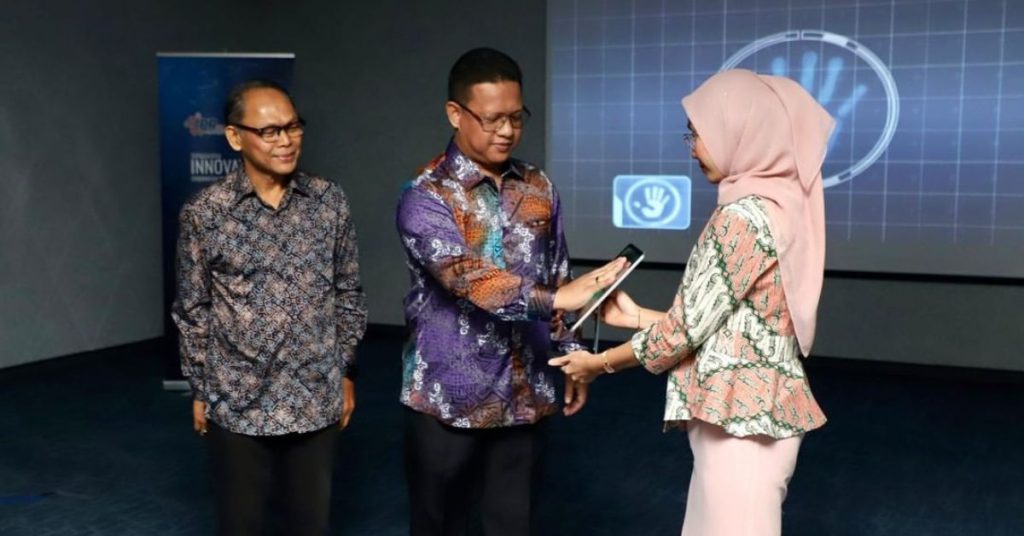
And that’s what MyIPO intends to expand on at National Intellectual Property Day 2024, which has the theme of Harta Intelek Nadi Malaysia Madani (Intellectual Property at the Heart of Malaysia Madani).
It aims to recognise the creativity and innovation among Malaysians while educating participants on the importance of registering IPs, through award ceremonies and seminars.
Learn about all things IP
As we’ve detailed above, sufficient funding and support can be major barriers faced by innovators, creators, and SMEs when getting their IPs protected.
Thus, it’s worth highlighting that help can be found via public and private means, like MyIPO’s event, for example.
National Intellectual Property Day 2024 will bring together stakeholders in various sectors to encourage and support business owners, innovators, and creators in registering IPs.
The stakeholders that’ll be present at the event include government agencies, businesses, academia, and the legal community to share insights on the topic at hand.
For example, you’ll get to hear talks on how IPs can provide you with the tools to safeguard your rights. There will also be activities and workshops you can participate in to learn how to navigate legal frameworks and maximise the value of your intellectual assets.
You’ll also get to learn from the success stories of innovators and creators about their inventions and works that are registered in Malaysia.
Hopefully, these stories can be the push you need to get your IP registered, and in turn, drive Malaysia’s economic competitiveness.
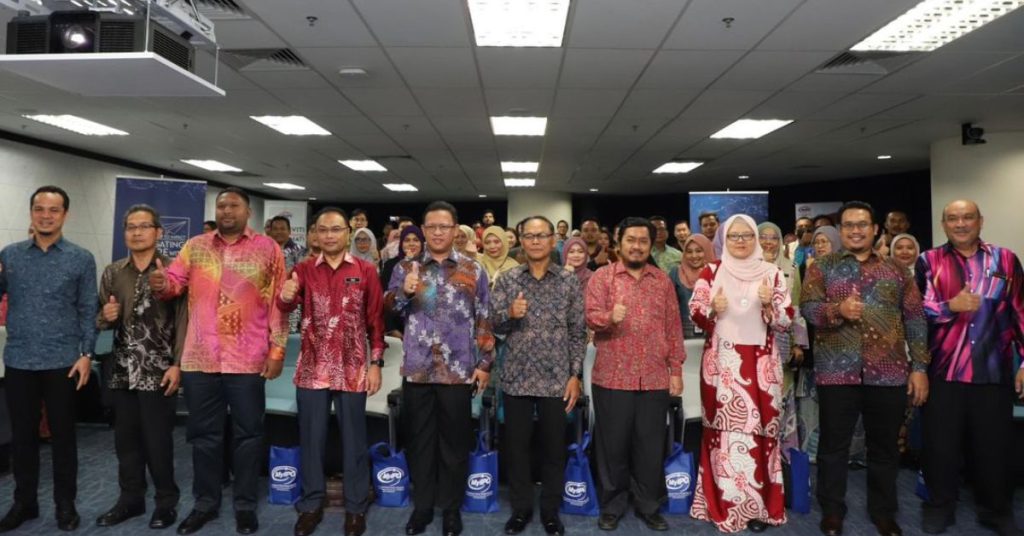
Moreover, you’ll get to partake in networking opportunities that could lead to advantageous business collaborations.
Leading up to the three-day event at MyIPO Tower, you can already get a head start at building your knowledge by participating in virtual talks hosted by MyIPO, which you can keep up with on its Facebook page.
Ultimately, while registering an IP may require quite an initial investment, the potential benefits could be substantial for your company’s competitive edge in the long run.
- Learn more about the National Intellectual Property Day 2024 event here.
- Read about other stories on Malaysian startups here.
Also Read: Employees need a Copilot to boost productivity & ease brain drain. This webinar shows how.
Featured Image Credit: MyIPO